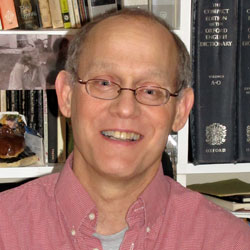The present tense
is the body’s past tense
here; hence
the ghost sludge of hands
on the now gray strip
of towel hanging limp
from the jammed dispenser;
hence the mirror
squinting through grime
at grime, and the worn-
to-a-sliver of soiled soap
on the soiled sink.
The streaked bowl,
the sticky toilet seat, air
claustral with stink—
all residues and traces
of the ancestral
spirit of body free
of spirit—hence,
behind the station,
at the back end of the store,
hidden away
and dimly lit
this cramped and
solitary carnival
inversion—Paul
becoming Saul
becoming scents
anonymous
and animal; hence,
over the insides
of the lockless stall
the cave-like
scribblings and glyphs
declaring unto all
who come to it
in time: “heaven
is here at hand
and dark, and hell
is odorless; hell
is bright and clean.”
Notes on the Poem
Alan Shapiro captures an unpleasant experience we can all admit to sharing - having to reluctantly enter and avail ourselves of a derelict and dirty restroom facility (washroom, toilet, lavatory or loo). How does he manage to take that experience, not flinch from describing it, but somehow transcend it? Certainly, he renders the repulsive setting and its filthy components accurately, from the towel to the mirror to the sink ... to, ahem, the bowl, the seat and the surrounding atmosphere. How does Shapiro keep us reading, even as he's forcing us to relive visits to places we'd rather forget? Some interesting repetitions and hints of rhymes seem to propel us forward to ... well, we're not sure what, starting with the clever and resonant lines: "The present tense is the body’s past tense here" followed by an incantation of the word "hence", which also rhymes with "scents", of course. "Paul becoming Saul" intrigues because it suggests something biblical and presumably more elevated in tone than what we've confronted so far in this poem. But hold on - didn't Saul become Paul? What does the reversal mean? Characterizing the typical graffiti found in places like this as "cave-like scribblings and glyphs" is both whimsical and possibly portentous. What Shapiro contends that it portends is the biggest reversal (or "inversion", as he also hints at) of all. The immediacy at all levels of the grimy restroom is actually a kind of heaven, and that which is bleached and sanitized and deodorized is the true hell. If he hasn't convinced all of us, Shapiro has certainly held our attention with this unlikely version of paradise right to the end of his thesis.
